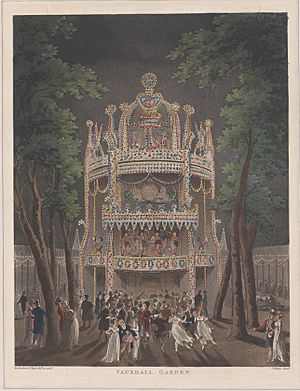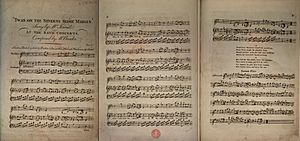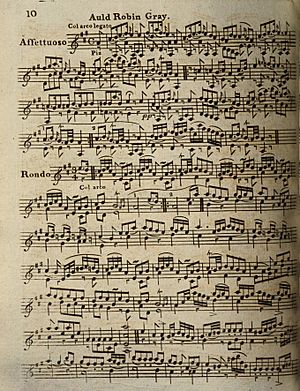James Brooks (musician) facts for kids
Quick facts for kids
James Brooks
|
|
|---|---|
| Born | c.1760 |
| Died | December 1809 (aged 49) |
| Resting place | unknown |
| Nationality | English, British |
| Occupation |
|
| Spouse(s) | Ann Barnard Brooks (c.1760-1821) |
| Children | Caroline Brooks (born probably c.1782) |
| Parent(s) | John Brooks (father, violinist) Sarah Brooks (mother) |
James Brooks was a talented English violin player and composer. He was born in Bath around 1760 and passed away in London in December 1809.
Contents
Early Life of James Brooks
James Brooks was likely born around 1760. We know this because when he was suggested for the Royal Society of Musicians in March 1783, he was said to be 23 years old. The Royal Society of Musicians was a group that helped musicians.
His father, John Brooks, was also a violinist. He played in a band led by Thomas Linley and taught music in Bath. John Brooks died before 1787.
James started playing the violin with his father at the New Assembly Rooms when he was just eleven years old. He began his full-time job as a musician around 1776.
James Brooks' Music Career
It seems James Brooks became the main violin player for concerts organized by William Herschel, a famous astronomer and musician. This happened after another musician, Thomas Shaw, moved to London.
For example, on October 12, 1778, a newspaper called the Salisbury and Winchester Journal announced a music event. It said that Mr. Brooks, junior, would be the "First Violin." This means he was the leader of the violin section. The event featured music by Handel and was led by Mr. Herschel.

In May 1779, the Bath Chronicle and Weekly Gazette advertised a new series of shows in Bath. These shows were like the famous Vauxhall Pleasure Gardens in London. James Brooks, junior, was again listed as the "first violin." This shows he was a very important musician in these popular events.
By his twenties, James Brooks was well-known among musicians in Bath. In May 1780, he was once more the band leader for a special concert.
James Brooks played a violin concerto (a piece for violin and orchestra) that he wrote himself in Bath in 1782 or 1783. By March 1783, he was working in London, playing at the opera. In October 1783, a show called A Lover's Device was performed at the Royal Circus. This show included two songs that James Brooks had composed.
He was probably the "Mr Brooks" who played the main violin at the "Commemoration of Handel" in 1784. This was a huge event with almost 500 musicians playing together to honor the composer Handel.
In the 1790s, James Brooks played at yearly spring concerts at St Paul's Cathedral in London. These concerts helped support the clergy (church leaders). He also played at concerts in Bristol during this time.
In 1800, he became the band leader at Vauxhall Gardens. This was a very popular place for entertainment in London. This job gave him the chance to write and publish many songs and instrumental music for the gardens. Some of his popular songs included William and Ann and How sweetly did the Moments pass. Famous singers performed his music. He continued to work at Vauxhall Gardens as band leader in 1807 and 1808. People liked his work there. The writer John Feltham said that Brooks chose his music with "great taste" and performed "with much éclat" (meaning with great success).
In 1804, when King George III became ill again, James Brooks wrote a special hymn (a religious song) for the King's recovery. He might also have played at the Drury Lane theatre in London during the 1807–08 season.
Illness and Death
James Brooks became ill in the second half of 1809 and passed away in December of that year. The Royal Society of Musicians gave him some money to help with his illness. After he died, they also gave his wife money for his funeral and a monthly payment to support her.
Musical Works
James Brooks wrote many different types of music.
Instrumental Music
| Violin Concerto No.1 in D major (published around 1785 and again in 1792) |
| Thirty six select Pieces for a military band (around 1796) |
Chamber Music
Chamber music is written for a small group of instruments.
| Three duets for two violins, op.3 |
| Two Duetts for One Performer on the Violin, op.4 (around 1802) |
| Twelve English Ballads, adapted for the Piano Forte, & Harp, with an Accompaniment (ad libitum) for a Flute or Violin, op.5 (published around 1800 or 1805) |
| Nocturne for the Pianoforte and Violoncello, Violin or Flute. (published after his death) |
| Sonata, for the Piano Forte in which is introduced the favorite air of "When forc'd from dear Hebe to go" (by Thomas Arne) with an accompaniment for the violin (around 1805) |
Vocal Music
This includes songs for singers.
Glees and Madrigals:
|
Songs and ballads, including:
|
Songs for Vauxhall Gardens:
|
Music for Stage Works:
|
Religious Music
| Hymn supplicating the Restoration of our Beloved Sovereign's Health (1804) |
Discography
- The Violin Concerto No.1 in D is available on:
 | Emma Amos |
 | Edward Mitchell Bannister |
 | Larry D. Alexander |
 | Ernie Barnes |



